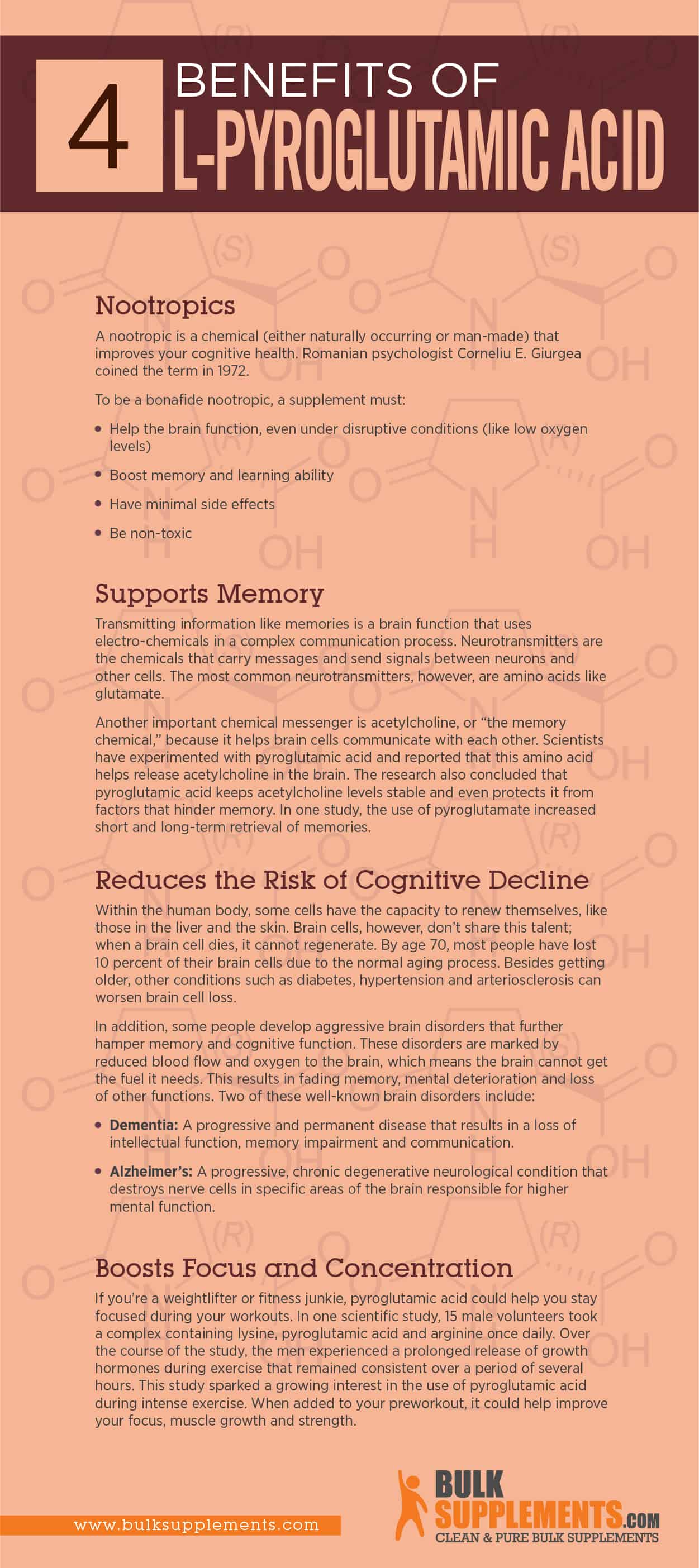L-Pyroglutamic Acid Benefits Side Effects and Dosage
by James Denlinger Digital Marketing StrategistWhat is L-Pyroglutamic Acid?
L-pyroglutamic acid is an amino acid that occurs naturally in the body. It is present in the brain, spinal fluid, skin and blood.
Pyroglutamic acid is a derivative of the body’s abundant amino acid glutamine. The change from glutamic acid to pyroglutamic acid occurs in the body through the activity of an enzyme. It wasn’t discovered until 1882, when scientists heated glutamic acid to 180 degrees Celsius. The heating process resulted in a loss of one water molecule, changing it from glutamine to pyroglutamic acid.
You can find pyroglutamic acid in plants and in various foods. It’s also becoming more widely available as a supplement or as an ingredient in supplements.
Pyroglutamic acid is in products labeled “cognitive enhancing.” Why? Because it helps maintain essential levels of acetylcholine, GABA and glycine — three key brain neurotransmitters. Pyroglutamic acid supplements could enhance memory, cognitive ability and more.
Glutamine: Parent of L-Pyroglutamic Acid
Pyroglutamic acid comes from the most plentiful amino acid in the human body: glutamine. Glutamine is a busybody chemical, facilitating more metabolic processes than any other amino acid in the body.
Glutamine builds proteins, helps maintain body pH and plays a key role in DNA synthesis. It’s also an ingredient in the important antioxidant glutathione.
Glutamine also:
- Helps replenish glycogen in the muscles after intense exercise
- Maintains the mucosal gut lining
- Improves immune function
- Increases muscle mass
- Serves as the main source of energy for some immune cells
- Acts as an emergency source of energy when blood levels of glucose fall
Glutamine is one of 20 naturally-present amino acids in protein. It’s found in high levels in eggs and in meat products. It’s also abundant in whey and casein proteins.
Glutamine is a key immune system booster and also benefits digestive health. Both your immune system and your GI tract often use glutamine for fuel instead of glucose.
L-Pyroglutamic Acid Benefits
Some call it “a forgotten metabolite,” and its complete benefits are currently unknown. But the desire for supplements without nasty side effects–combined with the growing frequency of degenerative brain conditions–make pyroglutamic acid a buzzword in research.
Researchers consider pyroglutamic acid a “nootropic”. What exactly is a nootropic?
Nootropics
A nootropic is a chemical (either naturally occurring or man-made) that improves your cognitive health. Romanian psychologist Corneliu E. Giurgea coined the term in 1972.
To be a bonafide nootropic, a supplement must:
- Help the brain function, even under disruptive conditions (like low oxygen levels)
- Boost memory and learning ability
- Have minimal side effects
- Be non-toxic
Today, many are quick to label chemicals as nootropics even if the chemical doesn’t fit all requirements. In casual conversation, people interchange the words “smart drug” and “nootropic,” assigning the names to anything that enhances cognition. People also commonly call an supplement a nootropic anytime it improves memory, speeds up thinking or boosts mental focus. Other nootropics include:
- Creatine: Creatine is an amino acid that may boost short-term memory, improve reasoning abilities and lessen stress.
- Caffeine: Caffeine is a natural element that can reduce reaction times and improve alertness.
- Omega-3 fatty acids: Omega-3 fatty acids improve mental energy, memory and cognitive focus.
- Panax ginseng root: This is a traditional medicine capable of expanding cognitive functions of the brain.
- L-theanine: L-theanine is an amino acid that may increase creativity and make one feel calm — combined with caffeine, it is very powerful.
- Gingko biloba: Some studies show that supplementing with ginkgo biloba extract can result in better mental processing and improved memory within the older population.
Supports Memory
Transmitting information like memories is a brain function that uses electro-chemicals in a complex communication process. Neurotransmitters are the chemicals that carry messages and send signals between neurons and other cells. The most common neurotransmitters, however, are amino acids like glutamate.
Another important chemical messenger is acetylcholine, or “the memory chemical,” because it helps brain cells communicate with each other. Scientists have experimented with pyroglutamic acid and reported that this amino acid helps release acetylcholine in the brain. The research also concluded that pyroglutamic acid keeps acetylcholine levels stable and even protects it from factors that hinder memory(x). In one study, the use of pyroglutamate increased short and long-term retrieval of memories.
In another study of patients with memory loss, researchers gave half of the participants a placebo, and the other half pyroglutamate. After 60 days of treatment, the subjects receiving the pyroglutamate showed a noticeable improvement in memory, while those who received a placebo did not.
Reduces the Risk of Cognitive Decline
Within the human body, some cells have the capacity to renew themselves, like those in the liver and the skin. Brain cells, however, don’t share this talent; when a brain cell dies, it cannot regenerate. By age 70, most people have lost 10 percent of their brain cells due to the normal aging process. Besides getting older, other conditions such as diabetes, hypertension and arteriosclerosis can worsen brain cell loss.
In addition, some people develop aggressive brain disorders that further hamper memory and cognitive function. These disorders are marked by reduced blood flow and oxygen to the brain, which means the brain cannot get the fuel it needs. This results in fading memory, mental deterioration and loss of other functions. Two of these well-known brain disorders include:
- Dementia: A progressive and permanent disease that results in a loss of intellectual function, memory impairment and communication
- Alzheimer’s: A progressive, chronic degenerative neurological condition that destroys nerve cells in specific areas of the brain responsible for higher mental function
Researchers are extensively studying degenerative brain conditions like dementia and Alzheimer’s, and have found that some natural supplements like pyroglutamic acid may improve symptoms without harmful side effects. Studies suggest pyroglutamic acid may slow the progression of age-related cognitive decline, boosting memory and learning capacity.
Boosts Focus and Concentration
If you’re a weightlifter or fitness junkie, pyroglutamic acid could help you stay focused during your workouts. In one scientific study, 15 male volunteers took a complex containing lysine, pyroglutamic acid and arginine once daily. Over the course of the study, the men experienced a prolonged release of growth hormones during exercise that remained consistent over a period of several hours. This study sparked a growing interest in the use of pyroglutamic acid during intense exercise. When added to your preworkout, it could help improve your focus, muscle growth and strength.
Other Pyroglutamic Acid Benefits
- Other names for L-pyroglutamic acid include PCA, L-PCA, 5-oxoproline, pyroglutamate or pidolic acid.
- Skincare and beauty products often use pyroglutamic acid as an ingredient because it acts as a humectant, meaning it retains moisture for hydration.
- Some testing has shown that pyroglutamic acid has anti-anxiety effects. It may relieve anxiety without the side effects of common anti-anxiety drugs.
- The combination of pyroglutamate and the amino acid arginine creates a powerful supplement for enhancing cognitive ability, which can benefit verbal memory and learning.
 PIN IT
PIN ITL-Pyroglutamic Acid Side Effects
As long as you stick to the recommended dosage, pyroglutamic acid is safe to take for healthy adults. However, taking too much pyroglutamic acid can result in metabolic acidosis. This condition occurs when there is too much acid in the body, which can put a strain on the kidneys. Metabolic acidosis symptoms may include abdominal pain, chest pain, decreased eyesight, heart palpitations and nausea. Severe cases of metabolic acidosis can be life threatening, so if you experience any of these symptoms, seek medical attention immediately.
Talk to your doctor before taking this supplement if you’re nursing or pregnant. Do not give pyroglutamic acid to children taking blood thinners.
L-Pyroglutamic Acid Dosage
You can find pyroglutamic acid supplements in capsule form or in nootropic complexes.
You can also mix pyroglutamic acid powder into a customized preworkout focus blend. As a dietary supplement, take 1,000 milligrams up to three times daily, or as directed by your physician. For best results, take pyroglutamic acid between meals.
Some people take 100 mg up to three times daily. Take as directed on the supplement package. Pregnant or lactating women, people with diabetes, hypoglycemia and people with known medical conditions and/or taking other supplements or drugs should consult a health practitioner. Additionally, young children or people who take blood thinners like Coumadin and Aspirin should not ingest pyroglutamic acid supplements.
The Bottom Line
Pyroglutamic acid is an amino acid derived from glutamine. It exists naturally in the human body, but is also present in meat, soy products and some fresh produce.
Research shows that it may boost memory, cognitive health and workout performance without harmful side effects. While research on pyroglutamate continues, existing studies suggest it’s a promising nootropic that can keep your brain healthy well into old age.
Sponsor Ads
Created on Apr 10th 2020 11:38. Viewed 400 times.




